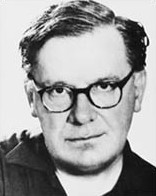Nikos Engonopoulos
Nikos Engonopoulos ( Greek Νίκος Εγγονόπουλος ; * October 21, 1907 in Athens , † October 31, 1985 in Athens) was a Greek painter and poet .
Life
Nikos Engonopoulos, son of an entrepreneur, commuted back and forth between Athens and its headquarters in Constantinople . When the whole family went to Constantinople on vacation in 1914, they were surprised by the start of the war and had to stay in Turkey until the end of the war in 1918 . Engonopoulos attended a Paris high school between 1919 and 1927 and completed his military service in Greece in 1927/28 . Between 1928 and 1930 he worked as a translator for a bank and as a secretary at the University of Athens . Subsequently, between 1930 and 1933 he was employed as a technical draftsman at the Urban Planning Office in the Ministry of Public Buildings. From 1934 to 1945 he worked as a senior civil servant at the Ministry of Public Works in Athens. Engonopoulos was drafted into the army in 1941 after the beginning of the war against the fascist Axis powers Italy and Germany and immediately transferred to the Albanian front. There he was taken prisoner by the Germans and taken to a labor camp from which he was able to escape. Between 1945 and 1964 he was a lecturer and between 1967 and 1973 he was a full professor and chair holder of free drawing at the National Technical University of Athens .
Between 1932 and 1940 Engonopoulos completed an evening course with Konstantinos Parthenis and Fotis Kontoglou at the Athens School of Fine Arts . From 1938 his paintings, drawings and serigraphs are part of many group exhibitions, but the list of his solo exhibitions at home and abroad is also very long. From the mid-1930s on, Engonopoulos also worked very successfully as a stage and costume designer for numerous theater performances. As a lyric poet (along with Giorgos Seferis , Odysseas Elytis , Andreas Embirikos and others) he belonged to the so-called “ generation of the 30s ” and decisively shaped the surrealist movement in Greece. In addition to many awards and prizes for his painting, Engonopoulos received the First State Prize for Poetry in 1958 and 1979.
Publications (poetry & prose)
- Conversations with the driver prohibited (1938)
- The pianos of silence (1939)
- Bolivar (1944)
- The Return of the Birds (1946)
- Eleusis (1948)
- The Atlantic (1954)
- In flourishing Greek language (1957)
- In the valley with the roses (1978)
Quotes
- “The most important thing during the beginnings of the surrealist movement in Greece was that Nikos Engonopoulos, whose poems struck suddenly and with unusual force, strengthened the wing of the 'uncompromising'. He was a born Orthodox. Imbued with surrealism like the electricity of the light pole. Who would not tolerate touch unless you were ready to take a strong blow for his sake. Aloof, suspicious, quarrelsome, he had refused to work with us for a long time. But his voice, even if it was only from afar, reached us immediately […] “ Odysseas Elytis
- “I was never a systematic writer, a systematic author, a littérateur. The great love of my life is exclusively painting. Every hour that I do not devote to painting seems to me a lost hour. But of course a picture does not require the constant devotion of the mind and the heart. There are moments when the hand draws on its own, so to speak. However, the brain is always working. And I benefit from that and think of different things or, usually, I make up songs. If I write these songs down after work, it is good, if not, I forget them again [...] After some thought and after my declaration that I was never a 'systematic' writer, I feel obliged to explain, that I was never a 'professional' painter either […] "Nikos Engonopoulos (1977)
- “He, red-faced, with shining eyes and an extraordinarily suggestive voice, always wore a narrow golden chain around his neck and a thick golden ring on the index finger of his right hand, which it was impossible to miss. Either he spoke with sweeping hand movements, or he was silent with his fingers spread apart, similar to the figures he painted and which, in most details, resembled Byzantine models. No one else knew French poetry as well as he did. The slightest allusion to a text - and if it had been the most absurd, the most lost in the realm of French literature of the Middle Ages - was enough for him to finish it with the most perfect pronunciation and with flying colors. " Odysseas Elytis
(from: Nikos Engonopoulos - Conversations with the driver prohibited )
literature
- Nikos Engonopoulos - Conversations with the driver are prohibited . Poems from Greek surrealism, selected and edited by Asteris Kutulas , translated by Asteris & Ina Kutulas . axel dielmann Verlag, Frankfurt / M. 2001
Web links
| personal data | |
|---|---|
| SURNAME | Engonopoulos, Nikos |
| ALTERNATIVE NAMES | Εγγονόπουλος, Νίκος (Greek) |
| BRIEF DESCRIPTION | Greek poet and painter |
| DATE OF BIRTH | October 21, 1907 |
| PLACE OF BIRTH | Athens |
| DATE OF DEATH | October 31, 1985 |
| Place of death | Athens |

